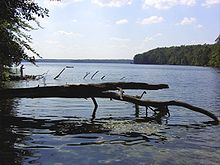Our website is made possible by displaying online advertisements to our visitors.
Please consider supporting us by disabling your ad blocker.
Thermal pollution


| Part of a series on |
| Pollution |
|---|
 |
Thermal pollution, sometimes called "thermal enrichment", is the degradation of water quality by any process that changes ambient water temperature. Thermal pollution is the rise or drop in the temperature of a natural body of water caused by human influence. Thermal pollution, unlike chemical pollution, results in a change in the physical properties of water. A common cause of thermal pollution is the use of water as a coolant by power plants and industrial manufacturers.[1] Urban runoff—stormwater discharged to surface waters from rooftops, roads, and parking lots—and reservoirs can also be a source of thermal pollution.[4] Thermal pollution can also be caused by the release of very cold water from the base of reservoirs into warmer rivers.
When water used as a coolant is returned to the natural environment at a higher temperature, the sudden change in temperature decreases oxygen supply and affects ecosystem composition. Fish and other organisms adapted to particular temperature range can be killed by an abrupt change in water temperature (either a rapid increase or decrease) known as "thermal shock". Warm coolant water can also have long term effects on water temperature, increasing the overall temperature of water bodies, including deep water. Seasonality effects how these temperature increases are distributed throughout the water column. Elevated water temperatures decrease oxygen levels, which can kill fish and alter food chain composition, reduce species biodiversity, and foster invasion by new thermophilic species.[5][6]: 375
- ^ a b "Brayton Point Station Power Plant, Somerset, MA: Final NPDES Permit". Boston, MA: United States Environmental Protection Agency (EPA). May 21, 2021.
- ^ Finucane, Martin (2017-06-01). "Mass. says goodbye to coal power generation". Boston Globe.
- ^ Kirillin, Georgiy; Shatwell, Tom; Kasprzak, Peter (2013-07-24). "Consequences of thermal pollution from a nuclear plant on lake temperature and mixing regime". Journal of Hydrology. 496: 47–56. Bibcode:2013JHyd..496...47K. doi:10.1016/j.jhydrol.2013.05.023. ISSN 0022-1694.
- ^ "Protecting Water Quality from Urban Runoff". Washington, D.C.: EPA. February 2003. Fact Sheet. EPA 841-F-03-003.
- ^ Goel, P.K. (2006). Water Pollution - Causes, Effects and Control. New Delhi: New Age International. p. 179. ISBN 978-81-224-1839-2.
- ^ Laws, Edward A. (2017). Aquatic Pollution: An Introductory Text (4th ed.). Hoboken, NJ: John Wiley & Sons. ISBN 9781119304500.
Previous Page Next Page


